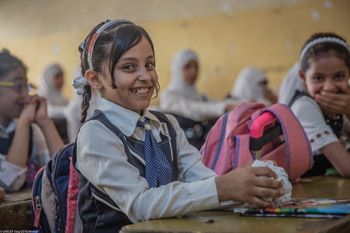UNICEF launches HAC 2019 appeal

"Water, it is difficult for the school to continue” says 11-year-old Zaynab. al-Zohoorr Girls School in Basra.
Kabul: The UN International Children’s Emergency Fund (UNICEF) Afghanistan on Sunday launched its Humanitarian Action for Children (HAC) 2019 appeal, highlighting a total of 6.3 million people in dire need of support, including 3.8 million children. The UN agency appealed for $50 million to provide much-needed lifesaving support to more than 570,000 children with basic health and nutrition packages, water, sanitation and hygiene, education and protection. “Despite efforts being made, children continue to bear the brunt of conflict; adverse climatic conditions including one of the worst droughts in years; a harsh winter; unprecedented levels of food insecurity and fragile social systems amongst others,” UNICEF Afghanistan representative said. In a statement from UNICEF, Adele Khodr said: “Some 3 out of 10 children are experiencing psychosocial distress, and some 600,000 children under the age of five years are suffering from severe acute malnutrition.” These resources will enable UNICEF to enhance its support to children suffering from severe acute malnutrition (SAM), expand the use of mobile health clinics in remote areas and in internally-displaced camps. It will also provide education support as well as child protection services to bring back a sense of normality to children’s lives. “With continued commitment of our partners, we can better support the government and people of Afghanistan to protect children during conflict, keep hope alive and begin to prepare children to shape peaceful futures for themselves and their communities. “Without significant sustained support, UNICEF will not be able to provide critical lifesaving assistance to families in need, especially children”, Khodr continued. The statement said 2019 marksed30 years of the Convention on the Rights of the Child, and 40 years of unrest in Afghanistan. Four decades of war have left an indelible impact on the country’s children. The safety and wellbeing of Afghanistan’s children was a collective responsibility, it concluded.





